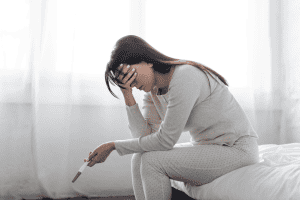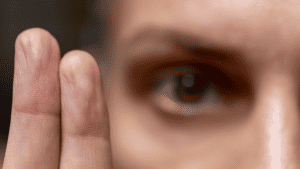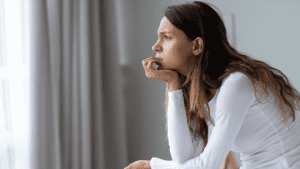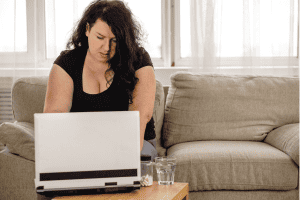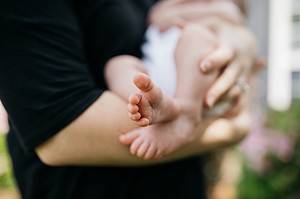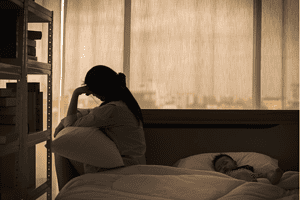Best Tips to Heal from Birth Trauma – from a Perinatal and Birth Trauma Specialist
“Why can’t I just get over my birth trauma?”
“Why am I still struggling with this? It’s been years.”
“I should be able to just move on.”
For those of us who have experienced birth trauma, these questions can play on repeat in our minds. Yet, they don’t move us forward towards healing.
The truth about healing from birth trauma
The truth is – no matter how resilient we are, or how much we know about birth trauma, this experience is not something we can simply will out of existence.
Because this is about so much more than birth not going as we expected – it’s that the joy and hope was replaced with fear, uncertainty, and pain.
The signs of birth trauma
Perhaps you have been ruminating on events that took place during your birth experience? Maybe you’re pulling apart every detail, trying to figure out the missing pieces? Or perhaps thoughts and memories are popping up when you least expect them?
Feeling on edge and anxious, experiencing flashbacks of the events that happened, and wanting to avoid people, places and conversations that remind you of these events are all your brain’s way of trying to protect you from the overwhelm of a traumatic birth experience.
We know through brain imaging studies that the parts of the brain responsible for our memory and fear responses (hippocampus and amygdala) among others, are impacted when we experience trauma.
The hippocampus is what gives our memories context in time. It helps sort our memories by flagging that “this happened in the past.” Because the hippocampus is often suppressed during trauma, we miss this important context – that these memories are from the past and not the present.
And so trauma memories continue to infiltrate the present – sounding the alarm that we are in danger.
This can look like:
- Re-experiencing the trauma through unwanted intrusive memories (emotional and somatic flashbacks, nightmares, and bad memories)
- Avoiding situations, people or places that remind you of the trauma
- Inability to rest
- Heightened startle response
- Outbursts
- Compulsive behaviours
- Social withdrawal
- Negative self talk
- Changes in appetite
- Avoidance of physical touch & intimacy
- Changes in communication
- Depression
These responses are the part of the body’s natural in-built response to a traumatic event. And this is why the brain will not allow you to simply “let go of” or “get over” the memory of your birth – because it believes if you do, you will be in danger again.
So, what can you do to heal from birth trauma?
Here are my best tips to heal from birth trauma
Having supported hundreds of women and men in the aftermath of birth trauma, and having my own lived experience of moving through it, I understand that birth trauma can feel like an endless loop playing on repeat.
However, it doesn’t have to feel like this forever. It’s possible to heal from birth trauma, and it’s never too late to start the healing process.
Here’s how:
1. Find a therapist in the know – someone experienced in working with birth trauma.
Support from an experienced and understanding perinatal and trauma counsellor can help you process and heal from your experience.
Counselling offers a safe space for:
- a) Clarity – surrounding the events that took place – in pregnancy, birth and postpartum – and why those events are impacting your current emotions, behaviours, relationships and physical health.
- b) Exploration – of your thoughts, feelings, body sensations and actions, without judgement.
- c) Tools – skills and coping strategies to respond to the reminders and emotions associated with your birth experience.
- d) Processing – to reduce post-traumatic emotional, psychological and physiological symptoms through the use of therapeutic approaches, such as EMDR, to help your brain and body heal from the trauma it has experienced.
Learn more about how birth trauma counselling can help.
2. Find a type of therapy that engages the mind AND the body
Trauma gets stored in the body (and the body often remembers far more than the mind).
Trauma-informed therapies, such as Eye Movement Desensitization and Reprocessing (EMDR), support your brain and body to process and re-sort the memories and triggers, so that they have less impact on you.
Here’s more information on the right time to start birth trauma counselling and choosing a counsellor.
3. Find ways to cultivate self-compassion
Where possible, practise making room to be kind to yourself as you navigate the changes birth trauma brings.
Sometimes when we’re hurting, our inner critic can come out and tell us that we’re not good enough, or that we should be doing more.
Self-compassion is compassion directed towards ourselves. It involves being aware of our own pain and suffering and directing feelings of kindness and care inwards – tending to our wounds and finding ways to nurture ourselves through the pain.
Remember, your experience is real, it’s valid, and giving voice to your experiences by talking to a person, writing in a journal, or even speaking the words out loud to yourself can open space for more self-compassion, processing and healing.
As a specialist perinatal and birth trauma counsellor in Australia, I can support you to find clarity, to safely explore your experiences, and to be resourced with the tools and skills to respond to triggers and reconnect with yourself.
If you’re looking for a counsellor that will not only listen to you, but will HEAR you, and work with you through the challenges you’re experiencing, please reach out. I’d love to support you in your healing journey.





